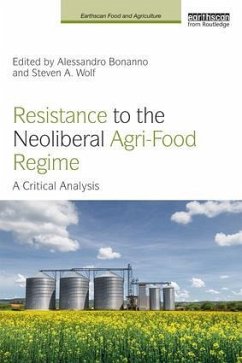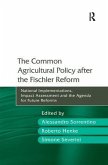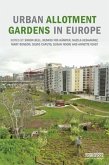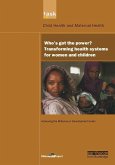Resistance to the Neoliberal Agri-Food Regime
A Critical Analysis
Herausgeber: Bonanno, Alessandro; Wolf, Steven A
Resistance to the Neoliberal Agri-Food Regime
A Critical Analysis
Herausgeber: Bonanno, Alessandro; Wolf, Steven A
- Gebundenes Buch
- Merkliste
- Auf die Merkliste
- Bewerten Bewerten
- Teilen
- Produkt teilen
- Produkterinnerung
- Produkterinnerung
Through a set of thematic and case study chapters, this volume explores the contents, forms, and actors that characterize current opposition to the corporate neoliberal agri-food regime.
Andere Kunden interessierten sich auch für
![The Common Agricultural Policy after the Fischler Reform The Common Agricultural Policy after the Fischler Reform]() Alessandro SorrentinoThe Common Agricultural Policy after the Fischler Reform131,99 €
Alessandro SorrentinoThe Common Agricultural Policy after the Fischler Reform131,99 €![Urban Allotment Gardens in Europe Urban Allotment Gardens in Europe]() Urban Allotment Gardens in Europe207,99 €
Urban Allotment Gardens in Europe207,99 €![Food Pedagogies Food Pedagogies]() Food Pedagogies197,99 €
Food Pedagogies197,99 €![Un Millennium Development Library: Who's Got the Power Un Millennium Development Library: Who's Got the Power]() Un Millennium ProjectUn Millennium Development Library: Who's Got the Power163,99 €
Un Millennium ProjectUn Millennium Development Library: Who's Got the Power163,99 €![Environmental Health Engineering in the Tropics Environmental Health Engineering in the Tropics]() Sandy CairncrossEnvironmental Health Engineering in the Tropics198,99 €
Sandy CairncrossEnvironmental Health Engineering in the Tropics198,99 €![Consumption Challenged Consumption Challenged]() Bente HalkierConsumption Challenged218,99 €
Bente HalkierConsumption Challenged218,99 €![Climate Change and Social Inequality Climate Change and Social Inequality]() Merrill SingerClimate Change and Social Inequality198,99 €
Merrill SingerClimate Change and Social Inequality198,99 €-
-
-
Through a set of thematic and case study chapters, this volume explores the contents, forms, and actors that characterize current opposition to the corporate neoliberal agri-food regime.
Hinweis: Dieser Artikel kann nur an eine deutsche Lieferadresse ausgeliefert werden.
Hinweis: Dieser Artikel kann nur an eine deutsche Lieferadresse ausgeliefert werden.
Produktdetails
- Produktdetails
- Verlag: Taylor & Francis
- Seitenzahl: 248
- Erscheinungstermin: 17. Oktober 2017
- Englisch
- Abmessung: 241mm x 161mm x 20mm
- Gewicht: 515g
- ISBN-13: 9781138723375
- ISBN-10: 1138723371
- Artikelnr.: 49606736
- Herstellerkennzeichnung
- Libri GmbH
- Europaallee 1
- 36244 Bad Hersfeld
- gpsr@libri.de
- Verlag: Taylor & Francis
- Seitenzahl: 248
- Erscheinungstermin: 17. Oktober 2017
- Englisch
- Abmessung: 241mm x 161mm x 20mm
- Gewicht: 515g
- ISBN-13: 9781138723375
- ISBN-10: 1138723371
- Artikelnr.: 49606736
- Herstellerkennzeichnung
- Libri GmbH
- Europaallee 1
- 36244 Bad Hersfeld
- gpsr@libri.de
Alessandro Bonanno is Texas State University System Regents' Professor and Distinguished Professor of Sociology at Sam Houston State University, Texas, USA. Steven A. Wolf is Associate Professor in the Department of Natural Resources at Cornell University, New York, USA.
Introduction Part I: The Corporate Domination of Agri-Food 1. Is Resistance
Futile? How Global Agri-Food Attempts to Co-opt the Alternatives 2. Best
Practices: The Artificial Negativity of Agri-Food 3. Accountability,
Rationality, and Politics: Critical Analysis of Agri-environmental Policy
Reform in USA 4. Market Civilization' and Global Agri-Food: Understanding
their Dynamics and (In)Coherence through Multiple Resistances 5. Resistance
to the Neoliberal Food Regime in the Sphere of Consumption: Considering the
Importance of Mental Labor in Food Provisioning Part II: Resistance
and/through the State 6. Reflecting on Counter-Hegemonic Strategies of Food
and Nutritional Security: Notes on the Brazilian Case 7.Geographical
Indication and Resistance in Global Agri-Food: The Case of Miso in Japan 8.
Community Action, Government Support and Historical Distance: Enabling
Transformation or Neoliberal Inclusions? Part III: The diversity of
Resistance 9. Peasant Resistance to the Transnationalization of Agriculture
in Mexico's South Frontier 10. Communities Against Capital? The Politics of
Palm Oil Expansion in Colombia's Middle Magdalena 11. Resisting Monsanto:
Monarch Butterflies and Cyber-Actors 12. Haiti - Open for Business': New
Perspectives on Inclusive and Sustainable Development 13. Imperfect,
Partial, and Interstitial: Gradations of Resistance in a Failed Food Hub
Conclusions: The Contradictions of Resistance to Neoliberal Agri-Food
Futile? How Global Agri-Food Attempts to Co-opt the Alternatives 2. Best
Practices: The Artificial Negativity of Agri-Food 3. Accountability,
Rationality, and Politics: Critical Analysis of Agri-environmental Policy
Reform in USA 4. Market Civilization' and Global Agri-Food: Understanding
their Dynamics and (In)Coherence through Multiple Resistances 5. Resistance
to the Neoliberal Food Regime in the Sphere of Consumption: Considering the
Importance of Mental Labor in Food Provisioning Part II: Resistance
and/through the State 6. Reflecting on Counter-Hegemonic Strategies of Food
and Nutritional Security: Notes on the Brazilian Case 7.Geographical
Indication and Resistance in Global Agri-Food: The Case of Miso in Japan 8.
Community Action, Government Support and Historical Distance: Enabling
Transformation or Neoliberal Inclusions? Part III: The diversity of
Resistance 9. Peasant Resistance to the Transnationalization of Agriculture
in Mexico's South Frontier 10. Communities Against Capital? The Politics of
Palm Oil Expansion in Colombia's Middle Magdalena 11. Resisting Monsanto:
Monarch Butterflies and Cyber-Actors 12. Haiti - Open for Business': New
Perspectives on Inclusive and Sustainable Development 13. Imperfect,
Partial, and Interstitial: Gradations of Resistance in a Failed Food Hub
Conclusions: The Contradictions of Resistance to Neoliberal Agri-Food
Introduction Part I: The Corporate Domination of Agri-Food 1. Is Resistance
Futile? How Global Agri-Food Attempts to Co-opt the Alternatives 2. Best
Practices: The Artificial Negativity of Agri-Food 3. Accountability,
Rationality, and Politics: Critical Analysis of Agri-environmental Policy
Reform in USA 4. Market Civilization' and Global Agri-Food: Understanding
their Dynamics and (In)Coherence through Multiple Resistances 5. Resistance
to the Neoliberal Food Regime in the Sphere of Consumption: Considering the
Importance of Mental Labor in Food Provisioning Part II: Resistance
and/through the State 6. Reflecting on Counter-Hegemonic Strategies of Food
and Nutritional Security: Notes on the Brazilian Case 7.Geographical
Indication and Resistance in Global Agri-Food: The Case of Miso in Japan 8.
Community Action, Government Support and Historical Distance: Enabling
Transformation or Neoliberal Inclusions? Part III: The diversity of
Resistance 9. Peasant Resistance to the Transnationalization of Agriculture
in Mexico's South Frontier 10. Communities Against Capital? The Politics of
Palm Oil Expansion in Colombia's Middle Magdalena 11. Resisting Monsanto:
Monarch Butterflies and Cyber-Actors 12. Haiti - Open for Business': New
Perspectives on Inclusive and Sustainable Development 13. Imperfect,
Partial, and Interstitial: Gradations of Resistance in a Failed Food Hub
Conclusions: The Contradictions of Resistance to Neoliberal Agri-Food
Futile? How Global Agri-Food Attempts to Co-opt the Alternatives 2. Best
Practices: The Artificial Negativity of Agri-Food 3. Accountability,
Rationality, and Politics: Critical Analysis of Agri-environmental Policy
Reform in USA 4. Market Civilization' and Global Agri-Food: Understanding
their Dynamics and (In)Coherence through Multiple Resistances 5. Resistance
to the Neoliberal Food Regime in the Sphere of Consumption: Considering the
Importance of Mental Labor in Food Provisioning Part II: Resistance
and/through the State 6. Reflecting on Counter-Hegemonic Strategies of Food
and Nutritional Security: Notes on the Brazilian Case 7.Geographical
Indication and Resistance in Global Agri-Food: The Case of Miso in Japan 8.
Community Action, Government Support and Historical Distance: Enabling
Transformation or Neoliberal Inclusions? Part III: The diversity of
Resistance 9. Peasant Resistance to the Transnationalization of Agriculture
in Mexico's South Frontier 10. Communities Against Capital? The Politics of
Palm Oil Expansion in Colombia's Middle Magdalena 11. Resisting Monsanto:
Monarch Butterflies and Cyber-Actors 12. Haiti - Open for Business': New
Perspectives on Inclusive and Sustainable Development 13. Imperfect,
Partial, and Interstitial: Gradations of Resistance in a Failed Food Hub
Conclusions: The Contradictions of Resistance to Neoliberal Agri-Food








